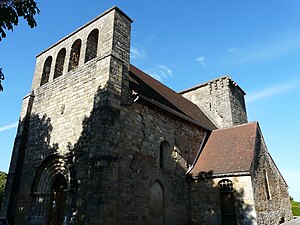Fleurac (Dordogne)
|
Fleurac Flurac |
||
|---|---|---|

|
|
|
| region | Nouvelle-Aquitaine | |
| Department | Dordogne | |
| Arrondissement | Sarlat-la-Canéda | |
| Canton | Vallée de l'Homme | |
| Community association | Vallée de l'Homme | |
| Coordinates | 45 ° 1 ′ N , 1 ° 0 ′ E | |
| height | 72-281 m | |
| surface | 22.18 km 2 | |
| Residents | 244 (January 1, 2017) | |
| Population density | 11 inhabitants / km 2 | |
| Post Code | 24580 | |
| INSEE code | 24183 | |
| Website | http://fleurac.jimdo.com/ | |
 Church Sainte-Marie |
||
Fleurac ( Occitan : Flurac ) is a place and a municipality ( commune ) in southwestern France with 244 inhabitants (as of January 1, 2017) in the old cultural landscape of the Périgord in the Dordogne department in the Nouvelle-Aquitaine region .
location
The place Fleurac is located in the valley of the Vézère at an altitude of approx. 100 m above sea level. d. M. about 33 kilometers (driving distance) northwest of Sarlat-la-Canéda or about 36 kilometers southeast of Périgueux . Several hamlets and farmhouses also belong to the community.
Population development
| year | 1968 | 1975 | 1982 | 1990 | 1999 | 2006 | 2012 |
| Residents | 285 | 239 | 219 | 220 | 221 | 270 | 239 |
In the 19th century the population of the community was mostly between 700 and 1050. The phylloxera crisis in viticulture and the loss of jobs due to the mechanization of agriculture led to a continuous population decline, which reached its lowest point in the 1980s and 1990s.
economy
Up to the present day agriculture plays the biggest role in the economic life of the municipality. However, the viticulture practiced here was completely given up after the phylloxera crisis ; a revival of the tradition in the 1920s was ultimately unsuccessful. Tobacco and corn are also on the decline - instead fields and pastures, but also walnut , chestnut and fruit trees dominate the region. Also, foie gras and truffles are among the best regional cuisine. Some vacant houses are rented out as holiday apartments ( gîtes ).
history
Fleurac has been documented under the name of Floyracum since the 13th century , but the Romanesque parish church indicates that the place was founded further back.
Attractions
- The Romanesque parish church of Saint-Marie with its rectangular tower, which was built above the apse after the turmoil of the Hundred Years War (1337-1453) and provided with loopholes , shows a clear defensive character. The distinctive bell gable ( clocher mur ), however, dates from the 19th century; whether he replaced a dilapidated predecessor is unclear. The archivolt portal was also renewed during this time; on the other hand, a small Gothic gate was bricked up on the south side.
- There are several country estates ( châteaux or manoirs ), most of which date from the 18th and 19th centuries or were rebuilt during this period , all of which are privately owned.
- Surroundings
- The Rouffignac cave, visited by prehistoric people and decorated with paintings, is only about a kilometer to the west in the area of the neighboring municipality of Rouffignac-Saint-Cernin-de-Reilhac .
Others
The place is mentioned in the novel Schloss Fleurac or The beautiful Marguerite by Hildegard Holtschneider.
Web links
- Fleurac - Photos + Info (French)
- Fleurac, church - photo + info (French)
